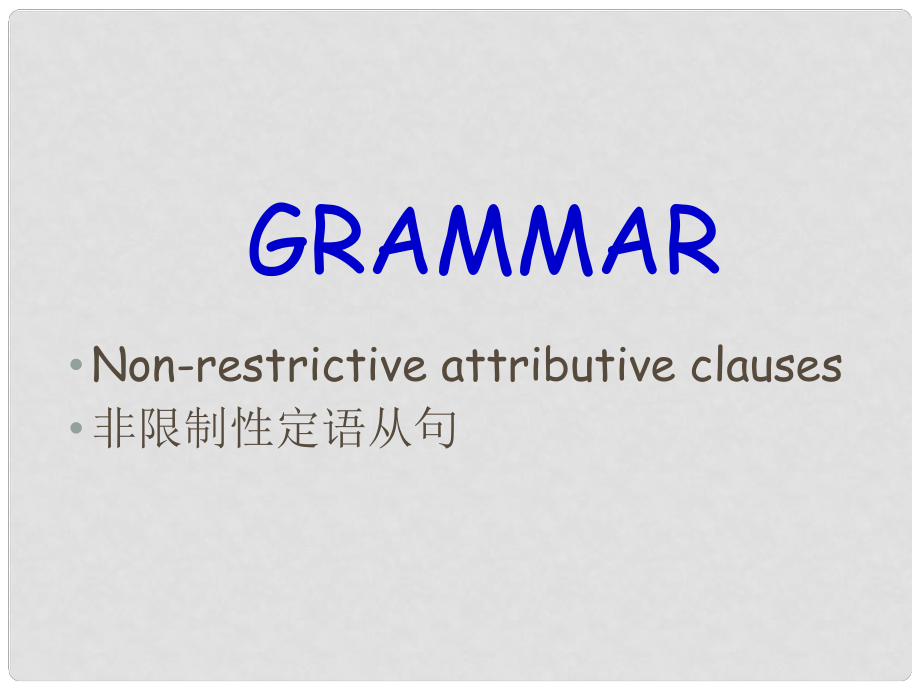《山東省冠縣武訓(xùn)高級(jí)中學(xué)高中英語(yǔ) module 6 grammar課件 外研版必修3》由會(huì)員分享��,可在線(xiàn)閱讀����,更多相關(guān)《山東省冠縣武訓(xùn)高級(jí)中學(xué)高中英語(yǔ) module 6 grammar課件 外研版必修3(23頁(yè)珍藏版)》請(qǐng)?jiān)谘b配圖網(wǎng)上搜索����。
1、GRAMMARNon-restrictive attributive clauses 非限制性定語(yǔ)從句非限制性定語(yǔ)從句非限制性定語(yǔ)從句 概念:非限制性定語(yǔ)從句用來(lái)對(duì)先行詞補(bǔ)充說(shuō)明��,沒(méi)有它��,主句也能獨(dú)立存在�,非限制性定語(yǔ)從句和主句的關(guān)系不密切,它與先行詞之間常用逗號(hào)隔開(kāi).Compare the two sentences in the same group and find the difference.Discuss & Summarize Discuss & Summarize (group work)(group work)第一組A.The old man has a son, who i
2��、s in the army.B.The old man has a son who is in the army.第二組A.My younger brother who is 18 years old is a college student.B.My younger brother, who is 18 years old, is a college student.第三組A.Jim doesnt like to ask questions which make his teacher angry.B.Jim doesnt like to ask questions, which makes
3�����、 his teacher angry.第一組A.The old man has a son, who is in the army.B.The old man has a son who is in the army.第一組:A中的從句是非限制性定語(yǔ)從句�����,是對(duì)先行詞的補(bǔ)充說(shuō)明。整個(gè)句子的意思是:這位老人有一個(gè)兒子���,在部隊(duì)工作�。(隱含的意義:只有一個(gè)兒子)B中的從句是限制性定語(yǔ)從句�,作用是對(duì)先行詞son進(jìn)行限定、修飾���。整個(gè)句子的意思是:這位老人有個(gè)在部隊(duì)工作的兒子��。(隱含的意思:也許還有其他的兒子�,在干別的工作)第二組A.My younger brother who is 18 years ol
4��、d is a college student.B.My younger brother, who is 18 years old, is a college student.第二組:雖然兩句的表達(dá)順序完全相同��,但是由于停頓和語(yǔ)調(diào)的變化����,造成的定語(yǔ)從句與主句關(guān)系的緊密程度發(fā)生變化。A句可以翻譯成:我18歲的那個(gè)弟弟是大學(xué)生����。從句是限制性定語(yǔ)從句��,是限定性定語(yǔ)從句限定了先行詞的意義����,明確是18歲的那個(gè)弟弟(而不是其他的�,即有可能還有幾個(gè)弟弟)。B可以翻譯成:我弟弟是大學(xué)生����,今年18歲。第三組A.Jim doesnt like to ask questions which make his teac
5�、her angry.B.Jim doesnt like to ask questions, which makes his teacher angry.第三組:A句中的定語(yǔ)從句修飾先行詞questions����,B句中的定語(yǔ)從句修飾的是整個(gè)前面的主句部分,所以表達(dá)的意義也就有明顯的差別��。A吉姆不喜歡問(wèn)使老師生氣的問(wèn)題�。(which 指代questions)B吉姆不喜歡問(wèn)問(wèn)題,這讓老師很生氣�。(which指代Jim doesnt like to ask questions 這個(gè)情況)溫馨提示:某些句子用了逗號(hào)成為非限制性定語(yǔ)從句,同沒(méi)有用逗號(hào)的相比,意義有很大區(qū)別 1.I have a sister
6�、who works in a hospital. 我有一位在醫(yī)院工作的姐姐。(不只一位姐姐)2. I have a sister , who works in a hospital.我有一位姐姐��,她在醫(yī)院工作。(只有一位姐姐)3. He has a brother, who lives in Beijing4. He has a brother who lives in Beijing.他有一個(gè)哥哥,住在北京.他有一個(gè)住在北京的哥哥(可能有幾個(gè)哥哥,其中一個(gè)是住在北京的.)More examples:非限制性定語(yǔ)從句非限制性定語(yǔ)從句: 對(duì)先行詞進(jìn)行補(bǔ)充對(duì)先行詞進(jìn)行補(bǔ)充說(shuō)明說(shuō)明,關(guān)系不是十分緊密
7�、關(guān)系不是十分緊密,省去對(duì)主句沒(méi)有多大省去對(duì)主句沒(méi)有多大影響影響.而限制性定語(yǔ)從句而限制性定語(yǔ)從句: 是先行詞在意義上是先行詞在意義上不可缺少不可缺少的定語(yǔ)的定語(yǔ),如果去掉如果去掉,主句的意思就不完主句的意思就不完整整.Non-restrictive attributive clause:A clause that adds extra information to the man clause of a sentence.限制性定語(yǔ)從句限制性定語(yǔ)從句 非限制性定語(yǔ)從句非限制性定語(yǔ)從句形式上形式上不用逗號(hào)和主句隔開(kāi)不用逗號(hào)和主句隔開(kāi)用逗號(hào)隔開(kāi)用逗號(hào)隔開(kāi)意義上意義上是先行詞不可缺少的是先行詞不可缺
8、少的定語(yǔ)�����,不能刪除定語(yǔ)�����,不能刪除是對(duì)先行詞的補(bǔ)充是對(duì)先行詞的補(bǔ)充說(shuō)明��,刪除后意思說(shuō)明���,刪除后意思仍完整仍完整譯法上譯法上 翻譯成先行詞的定語(yǔ)�����,翻譯成先行詞的定語(yǔ)�����,“的的” 通常翻譯成主句的通常翻譯成主句的并列句并列句關(guān)系詞關(guān)系詞的使用的使用 A做賓語(yǔ)時(shí)可省略做賓語(yǔ)時(shí)可省略 B 可用可用that A不可省不可省 B��。不用�。不用that Fill in the blanks with proper relative words.1.The famous basketball star, _is an American, came to China yesterday.2.In those days
9、,she used to go to Mr black,with _ she had a wonderful time.3.I bought a car yesterday,_ cost me a lot.4.Xian, _I visited last month, is a nice old city.5.He will come to see me next July, _ he wont be so busy.6.The school,_I once studied,was built thirty years ago.7.John said hed been working in th
10�、e office for an hour,_ was true.whowhomwhichwhichwhenwherewhich限制性定語(yǔ)從句和非限制性定語(yǔ)從句的區(qū)別: 一:在句中作用不同 限對(duì)先行詞有限定制約作用,不可省去��,否則句意不完整�。 非限起補(bǔ)充作用,可省去���,句意仍然完整���。 二:外在表現(xiàn)形式不同 非限用逗號(hào)隔開(kāi) 1. Do you remember the girl who taught us Chinese? 你還記得教我們語(yǔ)文的那個(gè)女孩嗎?2.Mr. Zhang, who came to see me yesterday, is an old friend of mine. 張先生昨
11、天來(lái)看我,他是我的一位朋友��。三:先行詞內(nèi)容有所不同 大多數(shù)限制性和非限制性定語(yǔ)從句的先行詞往往為一個(gè)詞或短語(yǔ)�,而特殊情況下非限制性定語(yǔ)從句的先行詞可以為一個(gè)句子����,此時(shí)要用which來(lái)引導(dǎo) 例 1. A middle-aged woman killed her husband, which frightened me very much. 一個(gè)中年女子殺害了自己的丈夫,這令我十分恐懼。 析:由語(yǔ)境可知,令“我”恐懼的內(nèi)容應(yīng)為“中年女子殺害了自己的丈夫”這整個(gè)一件事,因此先行詞為整個(gè)主句,此時(shí)應(yīng)由 which 引導(dǎo)定語(yǔ)從句����。 四:關(guān)系詞的使用情況有所不同 (1)that不可用于引導(dǎo)非限制性定語(yǔ)從句
12、他沒(méi)通過(guò)這次考試,令我很失望��。 誤: He didnt pass the exam, that disappointed me. 正: He didnt pass the exam, which disappointed me.使用非限制性定語(yǔ)從句時(shí)如果先行詞指人,則用who, whose����,which等;如果先行詞指物要用which����;先行詞表時(shí)間或者地點(diǎn),并在句中作時(shí)間狀語(yǔ)或者地點(diǎn)狀語(yǔ)時(shí)要用when或者where引導(dǎo)�����。 例 1. Well graduate in July, when we will be free. 我們將于七月份畢業(yè),到那時(shí)我們就自由了����。 例 2. Last Sunday
13、they reached Nanjing , where a conference was to be held. 他們上周日到達(dá)南京,有個(gè)會(huì)議要在那里舉行�。 (2)關(guān)系代詞替代情況不同 關(guān)系代詞whom在限制性定語(yǔ)從句中作賓語(yǔ)時(shí)可用who代替,但在非限制性定語(yǔ)從句中不行�����。 例 1. This is the girl whom I met in the street. 這是我在街上遇到的那個(gè)女孩��。 析:先行詞 the girl 在限制性定語(yǔ)從句中作賓語(yǔ),可用 who 代替 whom . 例 2. A young man had a new girl friend, whom he wanted
14、 to impress.一個(gè)年輕的小伙子新交了一個(gè)女朋友,他想給她留下深刻的印象�。 析:先行詞 a new girl friend 在非限制性定語(yǔ)從句中作賓語(yǔ),不可用 who 代替 whom .(3)關(guān)系代詞省略情況不同 關(guān)系代詞在限制性定語(yǔ)從句中作賓語(yǔ)可用省略,但在非限制性定語(yǔ)從句中所有的關(guān)系詞都不能省略�����。 例 1. This is the book (which/that) he lost yesterday. 這就是他昨天丟的那本書(shū)���。 析:先行詞 the book 在限制性定語(yǔ)從句中作賓語(yǔ),關(guān)系代詞 which 或 that 可以省略���。 例 2. The book, which he l
15、ost yesterday, has been found. 他昨天丟了這本書(shū),但現(xiàn)在已找到了����。 析:先行詞 the book 在非限制性定語(yǔ)從句中作賓語(yǔ),關(guān)系代詞 which 不可省。用定語(yǔ)從句挑戰(zhàn)高考原題(浙江(浙江2005)Jim passed the driving test, _ surprised everybody in the office. A. which B. that C. this D. it(浙江(浙江2005)_ I explained on the phone, your request will be considered at the next meetin
16��、g. A. When B. After C. As D. Since(浙江(浙江2006)I was given three books on cooking, the first _ I really enjoyed. A. of that B. of which C. that D. whichACB(浙江(浙江2007)Chans restaurant on Baker Street, _ used to be poorly run, is now a successful business. A. that B. which C. who D. where(浙江(浙江2008)Yesterday she sold her car, _ she bought a month ago. A. when B. where C. that D. which(浙江(浙江2009)The young man weve just talked to is a traveler _ parents visited us last year. A. that B. whose C. whom D. whichBBD
 山東省冠縣武訓(xùn)高級(jí)中學(xué)高中英語(yǔ) module 6 grammar課件 外研版必修3
山東省冠縣武訓(xùn)高級(jí)中學(xué)高中英語(yǔ) module 6 grammar課件 外研版必修3

